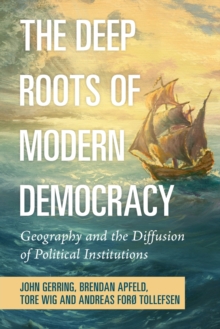Description
| Product ID: | 9781009114899 |
| Product Form: | Paperback / softback |
| Country of Manufacture: | GB |
| Title: | The Deep Roots of Modern Democracy |
| Subtitle: | Geography and the Diffusion of Political Institutions |
| Authors: | Author: Andreas Forø Tollefsen, Tore Wig, John Gerring, Brendan Apfeld |
| Page Count: | 360 |
| Subjects: | Comparative politics, Comparative politics |
| Description: | Select Guide Rating This book explores the deep roots of modern democracy, focusing on geography and long-term patterns of global diffusion, through statistical analyses of new databases, small-N studies and a review of the historical literature. It will appeal to historically-oriented social scientists, political historians, and anyone interested in democracy. This book explores the deep roots of modern democracy, focusing on geography and long-term patterns of global diffusion. Its geographic argument centers on access to the sea, afforded by natural harbors which enhance the mobility of people, goods, capital, and ideas. The extraordinary connectivity of harbor regions thereby affected economic development, the structure of the military, statebuilding, and openness to the world – and, through these pathways, the development of representative democracy. The authors'' second argument focuses on the global diffusion of representative democracy. Beginning around 1500, Europeans started to populate distant places abroad. Where Europeans were numerous they established some form of representative democracy, often with restrictions limiting suffrage to those of European heritage. Where they were in the minority, Europeans were more reticent about popular rule and often actively resisted democratization. Where Europeans were entirely absent, the concept of representative democracy was unfamiliar and its practice undeveloped. |
| Imprint Name: | Cambridge University Press |
| Publisher Name: | Cambridge University Press |
| Country of Publication: | GB |
| Publishing Date: | 2022-08-25 |


